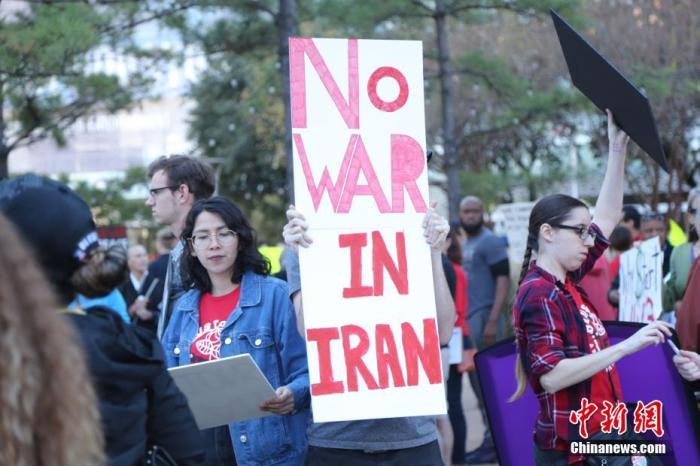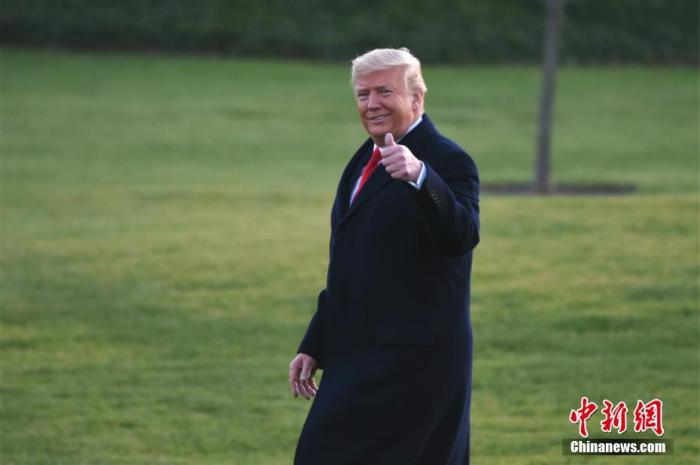Five questions about the situation in the Middle East: the United States and Iraq are fighting, Europe is panicking, and Trump will fall into a "war of attrition"?
BEIJING, January 7 (Guo Peishan) The US military killed Iranian commander Soleimani in Iraq, which stirred up a thousand waves: Iran announced its withdrawal from the Iranian nuclear deal and threatened "revenge", and the United States threatened to attack 52 targets in Iran; Iraqi parliament supports ending the stationing of foreign troops, and the leaders of Britain, France and Germany urgently discuss countermeasures … …
In the early morning of January 3, local time, according to the statement issued by the Iraqi security department, three missiles were attacked near Baghdad International Airport, and two vehicles were blown up, killing several people.
Suddenly, this devastated land in the Middle East has once again become the focus of the world. "Is the Third World War coming?" It has become a public concern. Will the "powder keg" in the Middle East be ignited? How will things develop? Zhongxin. com interprets it for you.
1. What will be the consequences of Iran’s announcement of its withdrawal from the Iranian nuclear deal?
Hua Liming, China’s former ambassador to Iran, said that after the United States withdrew from the Iranian nuclear deal in 2018, Iran still abided by the agreement because of the European reaction, but with the resumption of sanctions by the United States, the agreement itself no longer existed. Now that Soleimani has been killed, Iran thinks it is unnecessary to abide by the agreement.
At the same time, he also believes that Iran’s approach is bound to make Europe reassess the current situation. Trump has called the leaders of Britain, France and other countries, hoping that they will support the United States. Nowadays, there may be variables in the "queue" of European countries.
Dong Manyuan, a researcher at China Institute of International Studies, said that the main trend of Iran’s policy is to restore the domestic economy. Although Soleimani’s death has caused staged tension between the United States and Iran, in the long run, Iran still wants to ease relations with the United States and its regional allies, so all Iran’s current actions are still reversible.
Second, how will the "retaliation" threatened by the Iranian authorities be reflected?
Li Haidong, a professor at the Institute of International Relations of the Foreign Affairs University, said that Iran has been operating in the Middle East for a long time, with many allies and great flexibility. In other words, Iran can completely attack the interests of the United States in the Middle East without coming forward.
At present, people’s grievances are boiling all over Iran, but Dong Manyuan predicted that the "revenge" behavior in the mouth of the authorities would be "orderly".
Next, American institutions in the region may often be attacked by "unknown forces", but if the United States makes subjective assumptions and implements response measures without evidence, it will lose its moral foundation in the region, thus stimulating the upsurge of anti-American sentiment in the region. In this way, Iran can achieve the goal of "long-term consumption" of the United States.

On January 5th, local time, people in Houston, USA held an anti-war rally to condemn the US military for killing Iranian commander Soleimani. China News Service reporter Zeng Jingning photo
Third, did the United States anticipate Iran’s reaction, and how will it respond now?
Soleimani is a menace to the United States, which has long wanted to get rid of him. However, Hua Liming believes that the retaliation that may be suffered now and the turmoil in the Middle East, I am afraid that Americans have not fully thought about it in advance.
Dong Manyuan also made a similar analysis. After the killing of Soleimani, the U.S. military wanted to "stop as soon as possible", but faced with the Iranian threat of "revenge", it could only respond with a tougher attitude. The United States says that its first strike will destroy 52 targets in Iran, which actually reflects a nervous state of mind in the United States. In fact, Trump is still worried about Iran’s retaliation.
Will the conflict between the United States and Iraq continue to escalate? Li Weijian, vice president of the China Middle East Society, said that although the US killing action has further deepened the hatred between the United States and Iraq, on the one hand, Trump is constrained by the election; On the other hand, Iran cannot compete with the United States alone. Therefore, both countries have a bottom line — — To prevent the situation from getting out of control to the point where the two sides are going to war, no one can afford such consequences.

Data map: US President Trump.
4. Why does the Iraqi parliament support stopping anti-terrorism cooperation and ending the stationing of foreign troops?
In 2003, the United States bypassed the United Nations Security Council and launched the Iraq war. After the withdrawal of American troops in 2011, only a scarred Iraq was left. Hua Liming said that the US military belongs to the "invading army" in Iraq, which has not brought any benefits to the local people. Recently, it even killed Iranian generals on the territory of the country, ignoring its sovereignty and territorial integrity, which is bound to cause tension between the two countries.
Li Haidong said that, similar to Iran, there are a majority of Shiites in Iraq, which means that the two countries are united in their values. However, for a long time, the continued destructive intervention of foreign forces in the situation in Iraq has made the authorities restrained in making relevant decisions. Therefore, facing the contradiction between the United States and Iran, Iraq is in a dilemma.
Why did Iraq decide to end the stationing of foreign troops? Dong Manyuan said that this move is intended to safeguard its own sovereign security, not to stop anti-terrorism operations. Today, Iraq’s top priority is to defend the country’s sovereignty, territorial integrity and security.
5. The situation in the Middle East has suddenly escalated. Where is the regional situation heading?
Dong Manyuan said that after the US military killed Soleimani, the international oil price was the first to bear the brunt, and it has risen by more than 3%. But in the long run, the impact of the conflict between the United States and Iraq on the international energy market supply situation is relatively limited, because: first, the international oil supply situation exceeds demand; Second, American protectionism has caused the overall depression of the world economy; Third, under the sanctions of the United States, Iran has actually been excluded from the international oil market.
Regarding the pattern changes in the Middle East, Li Weijian said that various forces will be rebalanced in the turmoil, but there will be no fundamental and subversive changes. Moreover, the future policy changes of the United States towards Iran will be closely related to the domestic situation in the United States. However, no matter whether Trump is re-elected, the relationship between the United States and Iran will not change greatly.
In addition, Li Weijian also believes that over the past year or so, the influence of the United States in the Middle East has weakened, and Trump’s many measures on the Iranian issue seem to have not been approved by more countries. In the future, changes in the international situation will also have more impact on the region.